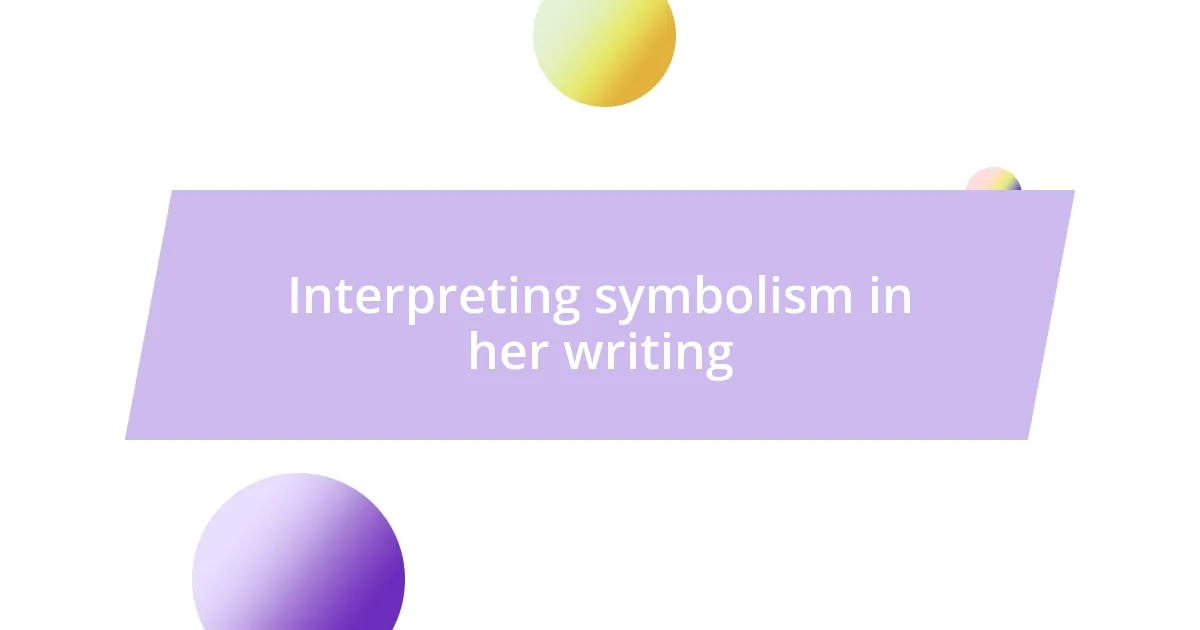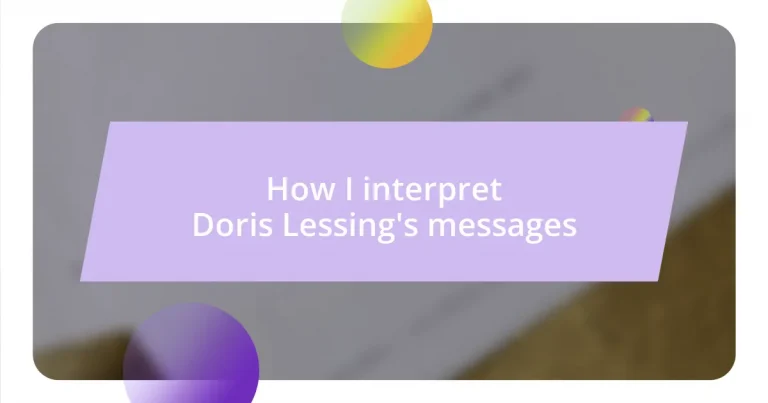Key takeaways:
- Doris Lessing’s philosophy emphasizes the complexity of human nature, urging individuals to explore the interplay between societal influences and personal identity.
- Her work highlights themes of feminism, mental health, and colonialism, encouraging awareness and dialogue about societal structures and their impacts.
- Lessing’s social commentary critiques class, gender dynamics, and existential questions, prompting readers to reevaluate their roles within society.
- Symbolism in her writing, such as nature and motherhood, offers profound insights into personal struggles and societal constraints, inspiring self-reflection and growth.

Understanding Doris Lessing’s philosophy
Doris Lessing’s philosophy often revolves around the complexity of human nature and the societal structures that shape our experiences. She invites us to question how much of our identity is crafted by external influences versus our own internal desires. Have you ever thought about how society molds your beliefs? It’s a profound aspect of her work that really resonates with me.
In many of her writings, Lessing emphasizes the importance of personal experience as a means of understanding broader truths. I remember reading “The Golden Notebook” for the first time and feeling as if Lessing was peeling back layers of my own life. It led me to ponder how fragmented our identities can be, reflecting the chaos of contemporary life and sparking a desire to seek coherence in my personal narrative.
Emotional resilience is another core tenet of Lessing’s philosophy. She champions the idea that, despite life’s turbulence, we must embrace our vulnerabilities. This realization struck a chord with me during a challenging period when I learned that vulnerability isn’t a weakness but rather a pathway to authentic connection and growth. It makes me wonder how many of us shy away from our true selves in fear of judgment. Lessing’s work urges us not only to confront our truths but also to celebrate them.

Exploring themes in Lessing’s work
Doris Lessing’s work intricately weaves themes of feminism and social justice throughout her narratives. Her stories often highlight the struggles of women in patriarchal societies, challenging societal norms and advocating for women’s independence. I remember feeling a sense of empowerment while reading “The Golden Notebook,” as Lessing portrayed her characters grappling with their identities amidst societal expectations. It made me question the stereotypes I’ve encountered and consider how they shape our perspectives on gender.
Another prominent theme in Lessing’s writing is the exploration of mental health and the complexities of human psyche. She delves deep into the inner workings of her characters’ minds, illustrating how mental health can be a reflection of societal pressures. I recall a conversation with a friend after reading “The Fifth Child,” where we explored how fear and anxiety can manifest in different ways, often leading to isolation. This theme resonated with me, as it encouraged a dialogue about the importance of mental health awareness and understanding our inner struggles.
Lessing also addresses the impact of colonialism and cultural identity through her characters’ journeys. She vividly illustrates how these historical contexts shape individual and collective identities. I was particularly struck by “The Grass is Singing,” where she captures the tension of cultural displacement. This became a catalyst for my own introspection about how our backgrounds influence our worldview and the value of embracing diverse narratives in our lives.
| Lessing’s Themes | Key Insights |
|---|---|
| Feminism | Challenges societal norms, empowering women to seek independence. |
| Mental Health | Explores complexities of the psyche, emphasizing the importance of awareness. |
| Colonialism | Examines its impact on cultural identity, urging acceptance of diverse narratives. |

Assessing Lessing’s social commentary
Doris Lessing’s social commentary captures the intricacies of human relationships and the ways in which societal structures shape our interactions. I’ve often found myself reflecting on her critique of the status quo, especially in “The Golden Notebook,” where the characters navigate political and psychological landscapes. This journey made me realize how deeply society influences our choices, often pushing us to conform rather than embrace individuality. It’s a stark reminder of the internal battles many face.
In assessing Lessing’s social commentary, several key insights emerge:
- Class and Inequality: She scrutinizes the divisions in society, prompting me to think critically about the privileges I might take for granted.
- Gender Dynamics: Lessing challenges traditional roles, compelling readers like me to examine my own relationships and biases.
- Existential Questions: Her exploration of identity and purpose resonates deeply, as I often reflect on what truly defines me beyond societal labels.
Her work encourages a continual re-evaluation of our place within society, pushing us to confront uncomfortable truths about ourselves.

Interpreting symbolism in her writing
Symbolism in Doris Lessing’s writing often carries profound layers of meaning that resonate on both personal and universal levels. For instance, I recall being captivated by the recurring imagery of nature in “The Grass is Singing.” It’s not just a backdrop; the landscape reflects the characters’ internal struggles and conflicts. This made me ponder: how often do our surroundings mirror our emotional states? I found that connecting symbols to my own experiences deepened my understanding of the character’s pain and hopes.
In exploring the symbols of confinement and liberation, I was struck by how they manifest in different characters across her works. Lessing often uses doors or barriers as symbols of societal constraints. When I read “The Golden Notebook,” I felt an intense sense of recognition in the struggle for personal freedom. It made me ask myself, what barriers do I face in pursuing my own passions? This connection inspired me to break down some of the constraints I had unconsciously accepted in my life.
Additionally, the symbolism of motherhood in her narratives embodies both creation and suffering. In “The Fifth Child,” the complex feelings surrounding motherhood—joy, fear, and obligation—resonated with me on a deeply personal level. Just as the characters grapple with their roles, I began to reflect on my own relationship with my mother. It prompted a heartfelt conversation with her about expectations and love, reminding me how pivotal those symbols of relationship dynamics can be in shaping our identities and experiences.

Applying Lessing’s messages today
Doris Lessing’s messages resonate powerfully in today’s world, especially in how we engage with societal norms. For instance, I often think about her take on gender roles, which prompts me to question the expectations I encounter daily. Just the other day, I caught myself debating whether to take a leadership role at work. Lessing’s emphasis on breaking free from traditional constraints inspired me to embrace the opportunity, realizing that my voice matters, irrespective of gender stereotypes.
Moreover, her insights into inequality spark a deep reflection within me. During a recent community event, I noticed the stark differences in our social backgrounds as people shared their stories. It reminded me of Lessing’s critiques. I couldn’t help but feel a call to action—how can I use my privilege to uplift others? This realization has motivated me to volunteer and engage in local discussions about social justice, fostering dialogue around the disparities that often go unnoticed.
Finally, I frequently find myself contemplating her existential themes, particularly regarding identity and purpose. In my quest for self-discovery, I’ve often asked myself: who am I beyond my job title or roles in society? Inspired by Lessing, I’ve taken to journaling my thoughts and experiences. Each entry feels like peeling back layers, revealing not just what defines me but also the societal influences that try to shape my identity. It’s a liberating process that reminds me, much like Lessing’s work, of the importance of introspection in navigating the complexities of modern life.














